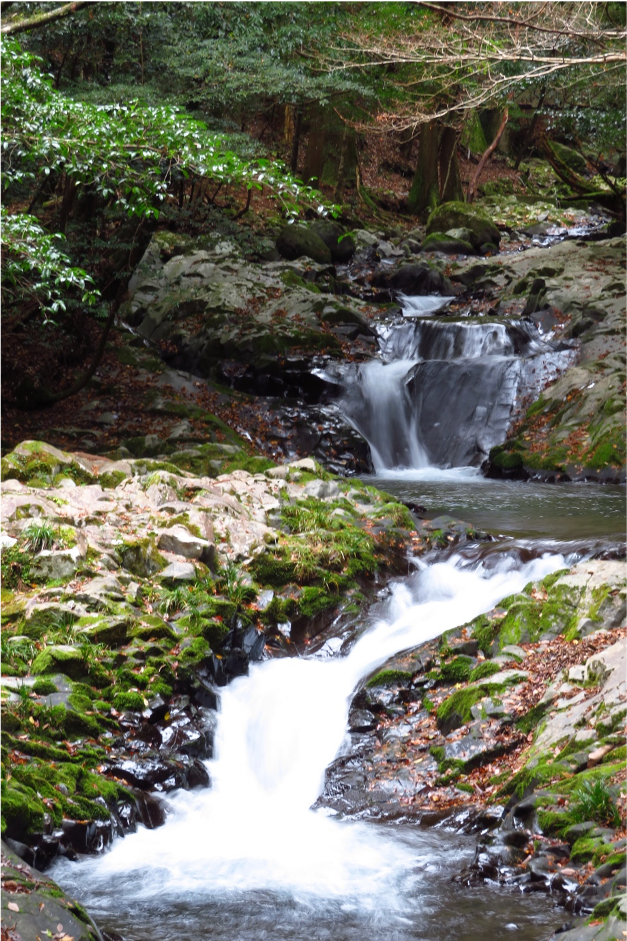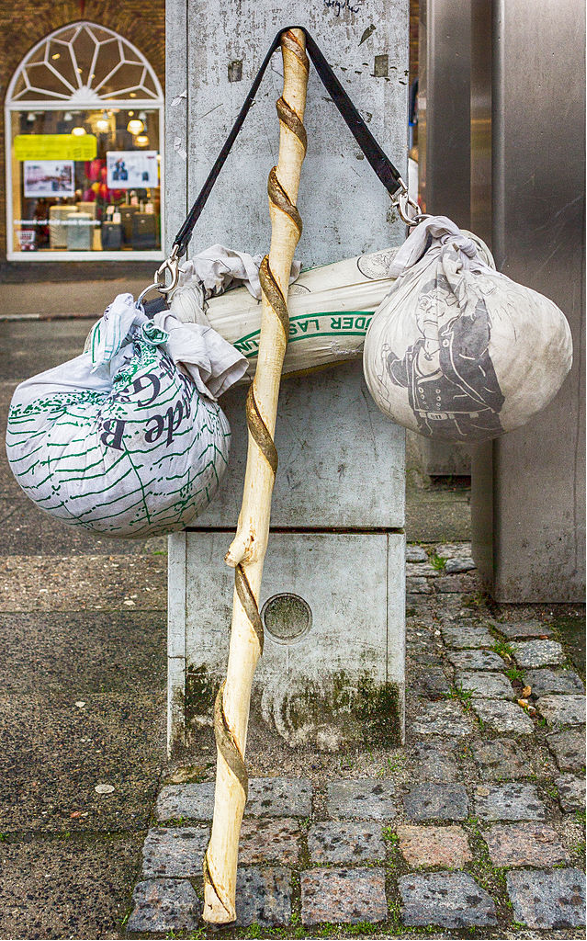Where to?
(Poet's title: Wohin?)
Set by Schubert:
D 795/2
[October to November 1823]
Part of Die schöne Müllerin, D 795
Ich hört’ ein Bächlein rauschen
Wohl aus dem Felsenquell,
Hinab zum Tale rauschen
So frisch und wunderhell.
Ich weiß nicht, wie mir wurde,
Nicht, wer den Rat mir gab,
Ich musste auch hinunter
Mit meinem Wanderstab.
Hinunter und immer weiter,
Und immer dem Bache nach,
Und immer heller rauschte,
Und immer heller der Bach.
Ist das denn meine Straße?
O Bächlein, sprich, wohin?
Du hast mit deinem Rauschen
Mir ganz berauscht den Sinn.
Was sag ich denn vom Rauschen?
Das kann kein Rauschen sein.
Es singen wohl die Nixen
Tief unten ihren Reihn.
Lass singen, Gesell, lass rauschen,
Und wandre fröhlich nach,
Es gehn ja Mühlenräder
In jedem klaren Bach.
I heard a brook babbling
As it emerged from the spring in the rocks,
Babbling down towards the valley
So fresh and wonderfully bright.
I do not know how it happened to me
Or who gave me the advice,
But I had to go down too
With my walking stick.
Down and further on,
And following the little river on and on,
And it babbled more and more brightly,
And the little river became brighter and brighter.
So, is that the road I have to take?
Little brook, speak, where to?
With your babbling you have
Completely addled my senses.
What on earth am I saying about babbling?
That can’t be babbling:
It must be water nymphs singing
As they dance deep down.
Let them sing, lad, let them babble
And get a move on – just follow them cheerfully!
There must be mill wheels turning
In that clear little river.
All translations into English that appear on this website, unless otherwise stated, are by Malcolm Wren. You are free to use them on condition that you acknowledge Malcolm Wren as the translator and schubertsong.uk as the source. Unless otherwise stated, the comments and essays that appear after the texts and translations are by Malcolm Wren and are © Copyright.
☙
Themes and images in this text:
Dancing Detours and delusions High, low and deep Mills Nymphs Rivers (Bach) Rivers (Bächlein) Springs, sources and fountains Valleys Walking and wandering Walking sticks (Wanderstab)


Puns and other untranslatables
Ich musste auch hinunter
Mit meinem Wanderstab.
A ‘Wanderstab’ is not really a ‘walking stick’. Just as pilgrims are recognisable by their pilgrims’ staffs, so journeymen as they went on their ‘Wanderjahre’ for three years and a day were expected to carry a distinctive wooden staff.


Und immer heller rauschte,
Und immer heller der Bach.
The sound was ‘bright’, but the little river looked ‘clear’. If we were to say in English that the river looked ‘bright’ it would almost certainly mean that it was reflecting the sun, which is probably not what is intended here. The miller lad seems to be saying that he can hear the clarity of the water in the sound it makes (even from a distance). It is as if we can see the stones and pebbles on the river bed as we hear the babbling. The senses have been fused.
Du hast mit deinem Rauschen
Mir ganz berauscht den Sinn.
rauschen (intransitive verb) (water, the sea, waterfalls) to roar; (gently) to murmur; (fire) to boom, to roar; (trees, woods) to rustle; (wind) to murmur; (silk) to rustle, to swish; (corn) to swish; (rain) to pour or swoosh down; (radio, loudspeakers etc.) to hiss; (mussels) to sing; (applause) to resound. im rauschenden Walde in the gently murmuring forest; mit rauschenden Flügeln with a swish or swoosh of its wings; rauschende Feste glittering parties; eine rauschende Ballnacht a glittering ball. Adapted from Collins German - English Dictionary 2nd edition 1991
berauschen (transitive verb) to intoxicate; to inebriate; to make euphoric; to enrapture; to exhilarate; to put in a frenzy. der Erfolg hat ihn völlig berauscht he was drunk or carried away with success; von Glück / Leidenschaft berauscht . . . in transports of happiness / passion . . .; berauscht von dem Wein / der Poesie / den Klängen intoxicated by the wine / intoxicated or enraptured by the poetry / the sounds Adapted from Collins German - English Dictionary 2nd edition 1991
A small river, such as the one the miller lad is following here, cannot possibly ‘roar’. However, brooks (like babies) can ‘babble’, so ‘babbling’ seems to be the best translation for ‘rauschen’ in this case. It is much more difficult to capture the pun that associates ‘rauschen’ with ‘berauschen’. Your babbling has addled my brain? The sound you make means that I am no longer of sound mind? I have been enraptured by your rippling?
Es singen wohl die Nixen
Tief unten ihren Reihn.
These water nymphs are singing along to their underwater dancing. It is a sort of line dance (although ‘eine Reihe’ is ‘a row’ or ‘a line’, it could be a square dance or a circular movement – it is formation rather than individual or pair dancing). The poet does not make an explicit pun here, but it is hard not to hear the overtones of the most famous water nymphs – the Rhine maidens or the daughters of the River Rhine (‘Rhein’ in German). Another homophone of Reihn / Rhein is ‘rein’ (pure), so Rhine Nymphs are also ‘pure nymphs’.
Ambiguities and puns of this nature reflect something of the miller lad’s state of mind as he decides to follow the sound of the river, the babbling of the brook which seems to be affecting his reason. He is not sure if what he is hearing is genuine. Are nymphs luring him to the depths? Can he trust his senses? Do words have fixed meanings? Is everything as ‘clear’ as it appears? Where is he really going? Wohin?
☙
Original Spelling Wohin? Ich hört' ein Bächlein rauschen Wohl aus dem Felsenquell, Hinab zum Thale rauschen So frisch und wunderhell. Ich weiß nicht, wie mir wurde, Nicht, wer den Rath mir gab, Ich mußte auch hinunter Mit meinem Wanderstab. Hinunter und immer weiter, Und immer dem Bache nach, Und immer heller rauschte, Und immer heller der Bach. Ist das denn meine Straße? O Bächlein, sprich, wohin? Du hast mit deinem Rauschen Mir ganz berauscht den Sinn. Was sag ich denn vom Rauschen? Das kann kein Rauschen sein: Es singen wohl die Nixen Tief unten ihren Reihn. Laß singen, Gesell, laß rauschen, Und wandre fröhlich nach! Es gehn ja Mühlenräder In jedem klaren Bach.
Confirmed with Gedichte aus den hinterlassenen Papieren eines reisenden Waldhornisten. Herausgegeben von Wilhelm Müller. Erstes Bändchen. Zweite Auflage. Deßau 1826. Bei Christian Georg Ackermann, pages 8-9; and with Sieben und siebzig Gedichte aus den hinterlassenen Papieren eines reisenden Waldhornisten. Herausgegeben von Wilhelm Müller. Dessau, 1821. Bei Christian Georg Ackermann, pages 9-10.
First published in a slightly different version with the title Der Bach in Gaben der Milde. Viertes Bändchen. Mit Beiträgen von […]. Für die Bücher-Verloosung “zum Vortheil hülfloser Krieger” herausgegeben von F. W. Gubitz. Berlin, 1818, page 215.
To see an early edition of the text, go to page 9 [Erstes Bild 20] here: https://download.digitale-sammlungen.de/BOOKS/download.pl?id=bsb10115224


